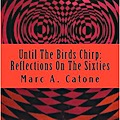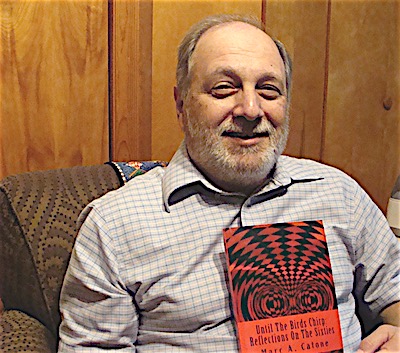- By Dan Veaner
- Around Town
 Print
Print  When Lansing author Marc Catone's book, 'The Giant's Chair' was published in 2005 he was already thinking about his next book. Over a decade later his autobiography, 'Until The Birds Chirp: Reflections on the Sixties' has been published, chronicling his experiences growing up in Danbury Connecticut during the decade of love, sex and rock and roll. While the '60s was a tumultuous, socially significant decade, most kids had their hands full just growing up. But growing up in the '60 inevitably meant being influenced by significant events and a very different way of seeing the world.
When Lansing author Marc Catone's book, 'The Giant's Chair' was published in 2005 he was already thinking about his next book. Over a decade later his autobiography, 'Until The Birds Chirp: Reflections on the Sixties' has been published, chronicling his experiences growing up in Danbury Connecticut during the decade of love, sex and rock and roll. While the '60s was a tumultuous, socially significant decade, most kids had their hands full just growing up. But growing up in the '60 inevitably meant being influenced by significant events and a very different way of seeing the world."My primary goal with this is two-fold," Catone says. "All along there has been a lot of '60s retrospectives on cable stations or in the movies or in books. They always ask the same people -- they've got Wavey Gravy on there. They've got Tom Hayden. They've got Grace Slick. I've got nothing against these people, I like them. They're not the only people who experienced the '60s. What about the common, ordinary guy and gal who had ordinary lives and the '60s were all-pervasive and influential on them? I was also hoping that maybe this book would inspire others to write about their experiences in the '60s, too."
'Until The Birds Chirp' is Catone's third book. 'As I Write This Letter' (1980) is a collection of Beatles fan essays and letters, fan artwork, and a running commentary by Catone. 'The Giant's Chair' is a novel about a writer in the 1990s who grew up in the '60s who is suffering from writer's block and writes a journal to find himself. Catone started 'Birds' in the late 1990s as a strict autobiography -- chronicling everything he did from the time he started walking. It sat on the shelf for a while until about six years ago he happened to pick up an issue of a writers magazine devoted to memoirs. One of the articles changed his entire approach.
"It said one of the biggest mistakes that people make is writing everything about their life," he says. "Let's face it, not every moment of everyone's life is really exciting or pertinent. They suggested thinking about writing stand-alone chapters that could be read separately and independently without necessarily having read the preceding chapter or the one after it."
The chapter that stands out most vividly for Catone is about the Kennedy assassination that took place when he was in eight grade. During a study hall in which he was studying for a spelling test, a teacher came into the room and whispered in the study hall teacher's ear.
"It was the most frightening moment I can remember," he recalls. "The color just drained from her face. She didn't scream or shout or start crying, but we knew something was up. Then the bell rang. We heard bits and pieces in the hallway, but when we got to home room our teacher told us what happened. At that point we didn't know that he was dead. We knew he had been shot. To this day I don't remember if we had a spelling test or not."
Catone says that is probably the most defining moment for people of his generation. But the book is more about what it was like to grow up in the '60s than a book about the history of that decade, so he juxtaposes the JFK assassination with the failure of his father's shoe business in nearby Bethel, Connecticut.
Other chapters highlight Catone's introduction to writing in the late '60s, racism, participating in the anti-war movement, and his hero, Muhammad Ali.
"I was this lower middle class white boy coming to grips with this quiet racism that was going around," he says. "My parents and their friends all had these prejudices which you had to overcome in your thinking. And it took a while for that to happen."
Then there was Woodstock. Or rather, for Catone there wasn't Woodstock.
"It's a very sad story about me and Woodstock," he says. "I wanted to go very badly. I lived in Danbury and it's only about a three hour ride. I didn't know anybody who was going. I didn't have a car. I wasn't one of these people who thumbed rides. About two weeks later I found out that two people I knew went and they said, 'Oh you could have gone with us.' That was my Woodstock experience."
 Marc Catone
Marc CatoneBut he did get to see the Beatles play at Shea Stadium. Twice. And he was active on his campus as an anti-Vietnam War protester.
"I had a very high number so I knew I wasn't going to get drafted," he says. "But I still felt I owed it to the people that I knew that were going to get drafted to try to stop the war. On May 4th, 1970 I had just gotten done with a march against the war on my campus and was in my room watching TV and that's when I learned about the Kent State 4. It had a really big impact on me because they were all my same age."
In the midst of the current presidential campaign we are a long way from the '60s both in years and philosophically. Catone is cynical about seeing a return to the ideals and idealism of that time.
"I certainly see it with Bernie Sanders," he says. "What he engendered in young people was very hopeful to me. I'm reluctant about how that's going to translate into an ongoing movement. Hilary Clinton is a little bit mainstream. I don't know what she will honestly incorporate. My hope is that she will realize there is a whole group of people she needs to win over so she will swing over a little bit more to the left. But will she forget them the day she is elected?"
Catone retired from the Tompkins County Recycling Center four months ago and is taking some time to get used to retirement. He has been concentrating on getting the new book out and, with the help of his childhood friend Mark Holmes, getting it set up on Amazon and promoting the book. So he says he doesn't have a new writing project in mind. Yet.
"I kind of write books every 20 years whether I need to or not," he says.
v12i26



